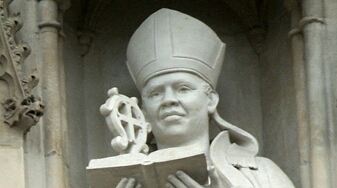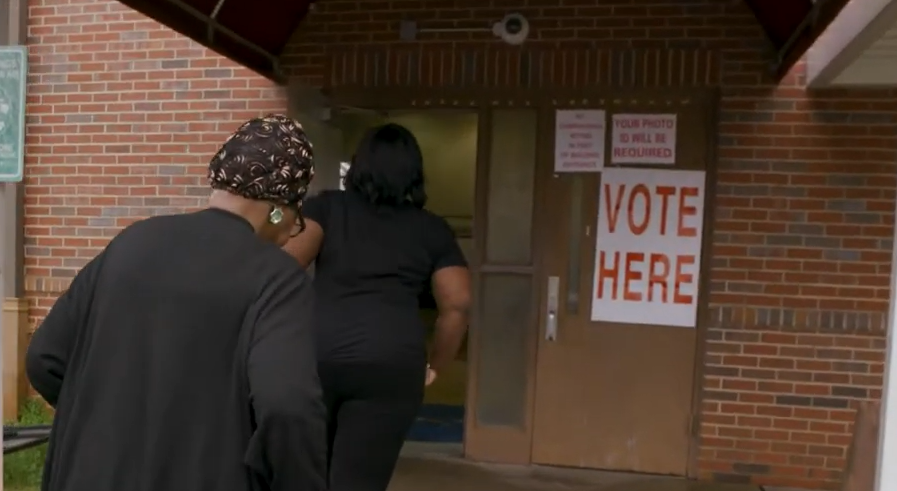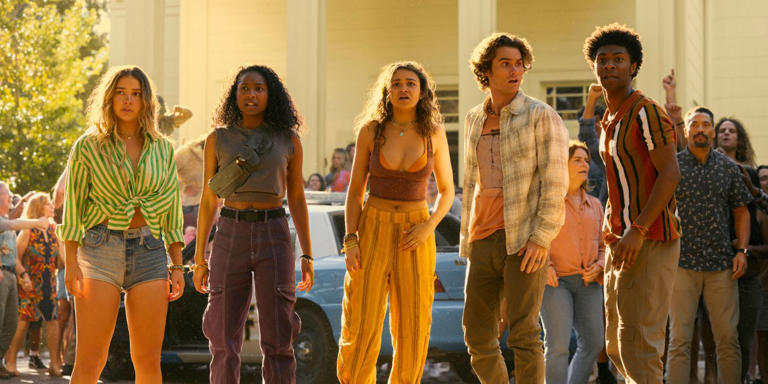February 17 marks the 40th anniversary of the murder of one of Africa’s most revered church man, Archbishop Janani Luwum, at the hands of dictator Idi Amin.
Like many Ugandans whom he touched, my family owe a special debt to Luwum. Not only was he a close family friend but he helped my family escape from Amin’s dictatorship.
The Beginnings: After a day of roaming the neighborhood, shooting at birds, always unsuccessfully, with home-made catapults, swimming in the local streams, and, during season, climbing mango trees all day in the hot Tropical African sun; the evening sun-set was always a welcoming and soothing event for us.
The orange glow of the setting sun meant we could collect our football from home and meet up on the sloping compound below St. Philips Church, in Mican –a locally corrupted acronym for Mission, also borne out of another colloquial acronym CMS or Church Missionary Society which is still popularly referred to as “Chemech”).
It was in this great church that I first came across His Eminence, Janani Luwum. This was the church I attended from birth but it is also the church that I was christened and later baptized in by none other than him in 1973 when he was the Bishop of Northern Uganda just before becoming the Archbishop of The Church of Uganda, Rwanda, Burundi and Boga Zaire the following year.
Indeed this was a moment of mixed joys to us; great jubilation that our beloved Bishop was going to lead the church in the country but also sadness at the fact that his family was moving away and our friends, especially Eric Lakidi (RIP) and Andrew Ojuk in my case, were leaving Mican. We would meet again, God would see to that.
Family ties: Unknown to me, this wasnt the first, and indeed it would not be the last time, that Archbishop Janani Luwum would cross our paths. Apparently, from some of the few photographs in our family album, a young Janani Luwum was a Page Boy at my parents wedding in Boroboro Teachers Training College in 1941 where he was a trainee teacher. I am sure it is Luwum’s saintly nature that blessed my parents with a blissful marriage which lasted over 55 years until my father passed on in 1996 and gave them 17 children and several grandchildren.
When Luwum moved to Gulu as the Bishop of Northern Diocese in 1969, his family became very close family friends. We grew up with the Luwum children with the eldest to the youngest studying with one or another of my siblings. Andrew Luwum and I remain very close friends. We played football together, hunted birds together and traded the odd punches and kicks on the play field. It was all the joys of growing up.
1971: When Idi Amin became the president of Uganda, taking over in a bloody coup from Apolo Milton Obote on 25th January 1971, in the ensuing days, months and years, almost the whole of Uganda was gripped in a state of anarchy. The region most devastated was the northern part and the ethnic groups that bore the brunt of Amins murderous rampages were the Acoli and the Langi, the latter being Obotes ethnic group. This was partly due to their link to the previous government and their concentration in the previous armed forces.
They faced regular persecutions ranging from arbitrary arrests to extra-judicial killings and in many instances public firing squads. Many others disappeared without a trace and others fled into exile. One such person was my father, who until 1972, had been serving as a District Commissioner for West Acoli District in the northern part of Uganda.
We would later learn that he had walked over 200 miles to Juba, which is today the capital of South Sudan. He eluded death; the fate of many of his peers.
1972 – 1975: My father’s mysterious disappearance from Uganda in September 1972, did not go down well with Idi Amin and his henchmen. I recall coming home one afternoon from my primary school which was literally across the road and alongside the golf course from the District Commissioners resident to find the DCs compound flooded with soldiers lazing about idly in the large compound surrounding the house. I walked gingerly past them and went into the house.
My mother was upstairs in their bedroom crying inconsolably. My father had gone to work that morning but had gone missing when some soldiers went to his office. That day there had been a purge on many Acoli men and women in Gulu town. Many people had already been arrested and taken to the army barracks that day and overnight, some had already been killed.
I vividly remember the names of the people murdered that time because I went to school with some of their children. What we were to discover a few months later was that when the soldiers went to my father’s office, he asked to go to the toilet and climbed out the window, borrowed an office messengers bicycle and rode out of town with some other civil servants and his trusty driver Olya all the way to the Sudanese border.
(Ironically he was to make a similar journey in 1987; escaping yet another war in the northern part of Uganda and again following similar routes).
The soldiers at the DC residents compound had been stationed there because my father had “disappeared” from his office and they thought he might show up at home at some point. What perhaps frustrated them the most is that he never did. This meant that all the attention and
frustration was then switched to my mother.
My mother faced endless harassment and persecution between 1972 and 1976. She was arrested and detained without trial repeatedly and in some cases, for days or weeks at the army barracks or the police station in Gulu.
On almost all of those occasions, Bishop Luwum, when he was in Gulu and Bishop Benoni Ogwal after him, always ventured above and beyond their call of duty and ensured they rescued my mother from wherever she was being held and fought the authorities to release her even going as far as contacting Idi Amin himself.
1976: One day around May 1976, my sisters Atim, Aneno, Ayat, Aywek and I came home for lunch. At the time I was in Primary 7 at Gulu Public School. We always came home for lunch and went back to school for afternoon classes. As soon as we got to the gate of our home in Customs Corner, Mican, we noticed the somber mood in the compound.
There was no sign of the daily hubbub of activity that greeted one whenever my mother was at home; she would be organizing everything from making the family meals to supervising the home helps and the farm managers –we had a poultry farm– and other businesses. My grandmother was at home seated in the veranda trying to look composed but we knew straight away there was something wrong.
My cousin James Nyeko and my older sister Akidi (RIP) were both at home. Apparently my mother had been picked up from home that morning in a very distinct Toyota Crown with the highly dreaded UVS registration plates that everyone across Uganda knew below to the notorious State Research Bureau, Idi Amin’s highly feared not-so-secret and brutal intelligence service.
If my memory still serves me right 40 years on, the full registration of that much feared car was UVS 267. What transpired over the next three months was the nightmare we always relive to our adulthood.
Our mother was taken from Gulu barracks to the police station that same day and transported in a police car to Kampala – that, to this date, we believe was her saving grace. The Gulu police commander – whose name I recall as Odomel – made sure that she went in a police vehicle. He knew why.
It was many years later, before my mother passed on in 2007, that we had lengthy conversations about the incident. Odomel had always been outwardly hostile towards my mother. This was in fact the reason why he was able to save her. He did not want Amin’s State Research Bureau to suspect he harbored sympathies.
We later learned that if my mother had been transported to Kampala in the dreaded UVS car, the plan was to have her not reach Kampala. What we now know since Idi Amin’s overthrow, is that many people were literally thrown alive off the Karuma Bridge on the Kampala-Gulu Highway into the fast flowing rapids of the River Nile beneath the bridge.
Fortunately, my mother made it alive to Kampala where she was held at Kampala Central Police Station cells for three months without charge or trial. Her crime? She was an Acoli woman and she would not give up her husband to the brutal regime of Idi Amin.
After much high level pressure lead by none other than Archbishop Luwum himself, my mother was eventually released. Life had been harsh for us; living at home without both parents. There were six of us; 11 had left Uganda over the years to study and had never returned due to the situation in the country.
I recall one evening in September 1976 when my uncle Apolo Lawoko, my mothers youngest sibling, suddenly appeared at home with my mother. We were asked to hastily pack a few
clothes and not carry anything else. We left our house and went to the home of Bishop Ogwal; the Northern Diocese Bishops residence at about 11 p.m.
We stayed there until about 4 a.m. when we left for Kampala in a Church owned VW Combi Van. As fate would have it, we had barely driven more than 6 miles to a place called Koro when the van developed some mechanical problems.
It had to return to Gulu town but because it was already daylight, we could not be seen in town. My five sisters. Lawino, Aywek, Ayat, Aneno, Atim and I hid in a deserted schoolyard. The van returned around 1 p.m. and we resumed our journey. We arrived in Kampala at around 6 p.m. and went straight to the residence of Archbishop Janani Luwum in Namirembe Hill in the suburbs of Kampala.
I recall the jolly reunion with the Luwum family who we had not seen since their move from Gulu over two years earlier. So much had happened in our lives but we could not share much as time was against us.
Auntie Mary Luwum made sure that we were comfortable and well looked after and bathed. His Eminence Archbishop Luwum came home in the evening at about 8 p.m. and we all had supper and prayed. My mother had now arrived from Gulu and she also joined us. We thought we were all spending the night with the Luwums.
Tororo then Kenya: At around midnight, we again set off; this time in another vehicle and this time my mother joined us. We arrived in the Eastern Ugandan town of Tororo at around 3 a.m., into the warm household of Bishop Yona Okoth of the Northern Eastern Diocese. He was, incidentally, the father of Mrs. Alice Ogwal, the wife of Bishop Ogwal, the Bishop of Northern Uganda Diocese.
We stayed at Bishop Okoth’s home for a day before my mother and sisters, Lawino and Aywek, left us one night for a very risky trip across the Ugandan-Kenyan border with Bishop Okoth and his son Sam Okoth (RIP).
In the morning, the Bishop was back and confirmed that my mother and sisters had crossed into Kenya safely and were now on their way to Nairobi to join my brother Dr. Luka Abe who was a lecturer at Nairobi University.
Two days later, we set off in Bishop Okoth’s Peugeot 504 Estate for the Malaba Border a few miles from Tororo town. The vehicle left us there and we crossed, into Kenya.
The Bishop, in his dog-collar, told everyone who needed to know that we were his children. We boarded a taxi service commonly called a Matatu for Nairobi with Bishop Okoth and traveled to Nairobi. I do not recall how long the journey was but I vaguely remember that we arrived in Nairobi very late in the evening very tired and totally fazed.
It had not been an easy trip for us. I was barely 10 years old and my youngest sister Atim was only six years old but the sight of my older siblings Lawino, Aywek, Luka and my mother made up for the fatigue and anxiety.
“It is better to travel in hope than to arrive” has been my quote since I was a little child having read Robert Louis Stevenson’s books when I was an eight-year-old growing up in Gulu town, in Uganda. What stuck was this phrase, a Robert Louis Stevenson’s quotation, from Virginibus Puerisque: “Little do ye know your own blessedness; for to travel hopefully is a better thing than to arrive, and the true success is to labor.”
I always thought that he might have adapted it from a Biblical quote; however what remains with me for the rest of my life is that all the way from Gulu to Nairobi, via Kampala and Tororo, we were in Gods hands. We traveled with, lived with and prayed with men of God and one of them is a Martyr of God.
Yes, escaping from a dictator who victimized perceived enemies and their families, we traveled in hope. The Book of Proverbs 6:22 states that: ”When you walk about, they will guide you; When you sleep, they will watch over you; And when you awake, they will talk to you.”
We traveled under wings of angels. No harm could come upon us. We walked with Bishop Benoni Abwang Ogwal from Gulu to Kampala; we dined and prayed with Archbishop Janani Luwum in Kampala; and, we slept at Bishop Yona Okoths home in Tororo. All that time they guided us, watched over us, and they talked to us.
Shortly after we arrived in Nairobi, Archbishop Luwum came home to check on us. This was about December 1976. He was also attending the All African Conference of Churches meeting in Nairobi, Kenya. He again prayed with us and gave his blessings to thank God that we had made it safely to Kenya.
Tragically, little did we know that this was the last time we would see him and pray together.
A few months later the Amin regime announced that Bishop Luwum together with two senior cabinet ministers had been killed in a car crash on February 17, 1977.
The deaths provoked a wave of international protest that was unprecedented in the six-year rule of General Amin. The regime’s claim that the three men died in a car crash on their
way to being questioned about alleged subversive activities was dismissed with disbelief. In neighboring kenya, the West African leader of the All-African conference of churches, Canon Burgess Carr, said the church feared the deaths may be part of a campaign of terror unleashed against Christians in Uganda.
As fate would have it, the two ministers who were killed with the Archbishop also had very close links to my family. Erinayo Oryema, the Minister for Lands, Housing and Physical
Planning was my father’s maternal uncle who taught him amongst other things, how to play the Acoli musical instrument called Nanga. Oboth Ofumbi, Minister of Internal Affairs, had started off his civil service career in Gulu and had become our very close family friend. The school that I attended, St. Mary’s School, in Nairobi, was also where Sam and Godfrey Oboth Ofumbi, my very old friends, went to school.
This was also the time when my maternal uncle Apolo Lawoko was in the dungeons of the Amin’s State Research Bureau headquarters and we did not know whether he would survive. He later escaped while several of his inmates were killed by firing squad.
This is my personal account of my family’s interaction with Janani Luwum a most remarkable human being.
Archbishop Luwum was indeed a real Saint who sacrificed his life so that others could live.
My prayer is to arrive in heaven and drop a real angels name, Luwum, at the Pearly Gates and hopefully be able to enter the gates once St. Peter learns that I know one of his angels personally. He blessed my family; from my parents marriage and many years later, spirited us safely way from the dictator’s clutches.
He remained in Uganda with the flock he was so devoted to. He paid the ultimate price.
Today Luwum is recognized as a martyr by the Church of England and the Anglican Communion and his death is commemorated on 17 February as a Lesser Festival. His statue is among the Twentieth Century Martyrs on the front of Westminster Abbey in London.
Frank Abe, the author is a practising solicitor and teacher in England & Wales and the East African Bar.
Note: If you have accounts of your personal interactions or memories of Janani Luwum that you’d like to share send it to [email protected]

















